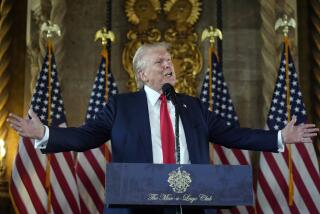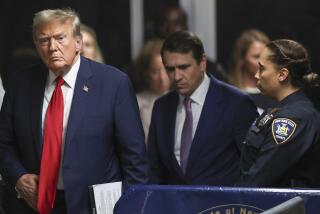Opinion: There’s no smoking gun in the Manafort indictment, but it’s still very bad news for Trump
- Share via
There’s no full-scale smoking gun in the charges against three former Trump campaign officials that were unsealed on Monday — if “smoking gun” means conclusive new evidence of secret collusion with Russia.
But the legal actions are still very bad news for President Trump.
It’s striking that Mueller moved so quickly to indict Paul Manafort, Trump’s former campaign chairman, and to make the charges public.
The methodical prosecutor is moving swiftly, as if he wants to put his evidence on the public record as fast as he can. That will make it harder for the Justice Department to walk away from these cases if Trump decides to fire him.
The other reason for Manafort’s indictment, of course, is to put pressure on him to tell the FBI what he knows about the campaign’s many dealings with Russian officials.
Unlike Manafort, Papadopoulos appears to be cooperating fully with Mueller’s investigators.
Manafort and his assistant Rick Gates weren’t indicted for colluding with Russia; they were indicted on charges of maintaining secret foreign bank accounts that handled more than $75 million, laundering more than $18 million for their personal use, and failing to pay taxes on the income.
In addition to criminal charges, the federal government can move to seize their assets. That’s a strong incentive to cooperate with the prosecutor.
Elsewhere on this page, two distinguished UCLA law professors note that the president could pardon Manafort to make it easier for him to remain silent. But that would be a politically perilous course. Trump would be pardoning a man facing charges of money laundering and income tax evasion, not political collusion. And Manafort could still face state tax charges in New York; a presidential pardon doesn’t cover state laws.
The guilty plea of a lower level campaign aide, George Papadopoulos, is important in a different way. It’s another piece of the growing pile of evidence that some in the Trump campaign actively attempted to collaborate with Russia.
Papadopoulos’ efforts sound almost amateurish; in the end, he never quite managed to set up a meeting between the campaign and the Kremlin. But he did alert the campaign’s higher-ups that the Russians claimed to have “dirt” on Hillary Clinton, including “thousands of emails.” His bosses on the campaign encouraged him to pursue the matter. (He apparently worked under the campaign’s chief policy advisor, then-Sen. Jeff Sessions, now the attorney general.)
There may be more to hear from Papadopoulos, too. Unlike Manafort, he appears to be cooperating fully with Mueller’s investigators.
The Papadopoulos channel isn’t the first evidence that the campaign attempted to get help from Russia, of course. It’s less damning, for example, than the meeting Donald Trump Jr. arranged with an influential Russian lawyer in July 2016. That meeting was at the campaign’s top level, including Manafort and first son-in-law Jared Kushner. It was arranged because the Kremlin-connected lawyer claimed to have dirt on Clinton. And once it was revealed, Trump Jr. made a series of misleading statements about it, reportedly encouraged by his father.
So while there is not conclusive public evidence of direct collaboration between the campaign and the Kremlin, there’s mounting evidence that both sides wanted to cooperate and actively explored what they could do for each other.
“There is NO COLLUSION,” President Trump tweeted on Monday. To paraphrase an earlier president, that may depend on what the definition of “is” is.
Twitter: @DoyleMcManus
Follow the Opinion section on Twitter @latimesopinion and Facebook
More to Read
A cure for the common opinion
Get thought-provoking perspectives with our weekly newsletter.
You may occasionally receive promotional content from the Los Angeles Times.











